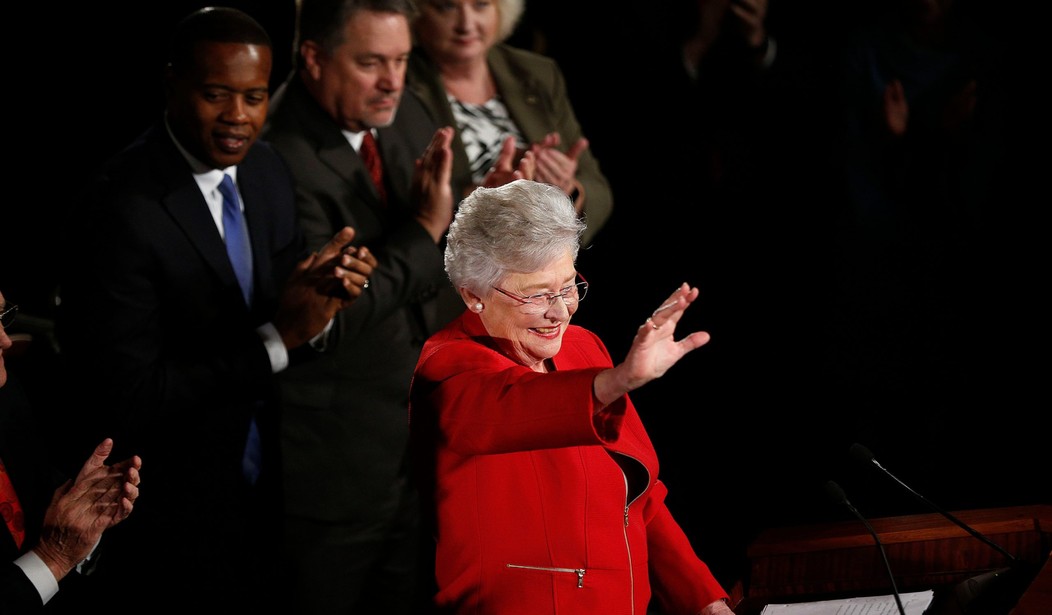Alabama Gov. Kay Ivey (R) said in defense of her first campaign ad that the last thing her constituents need is “folks from Washington” or “out-of-state liberals” telling them what to do with the state’s Confederate monuments and statues.
“We can’t and shouldn’t even try to change or erase or tear down our history. We must learn from our history,” Ivey said.
Kyle Whitmire, the Alabama Media Group’s state political columnist, said the Ivey campaign’s decision to run an ad supporting nearly year-old legislation to protect Confederate Civil War monuments from city officials who would tear them down “smells of polling and focus groups.”
“Someone in her campaign decided Ivey needed a knock-out blow – to finish off her GOP challengers and avoid a runoff altogether. They needed an issue,” Whitmire wrote.
One of the first things Kay Ivey did after taking over the Alabama governor’s office from Robert Bentley – who resigned facing a sex scandal – was sign the Alabama Memorial Preservation Act of 2017.
Now, she is running for election to her first full term in office and chose to make this issue the subject of her initial campaign ad.
An NBC News/SurveyMonkey poll released one week before Ivey’s ad started airing showed 61 percent of Southerners want Confederate monuments to stay right where they are. Support for the Old South is even stronger among people surveyed in Alabama, where 65 percent backed the Rebel Civil War monuments.
“I believe the people agreed with that decision and support protecting our historical monuments,” Ivey said.
The law requires local governments to get a state commission’s approval before doing anything to a historic statue, building or monument that is at least 40 years old.
“When special interests wanted to tear down our monuments, I said no, and signed a law to protect them,” Ivey said in the ad.
Ivey’s ad, which began running April 17, sparked new outrage from the Alabama NAACP.
The Alabama NAACP said in a statement the law only serves to remind African-American state residents of the politics of exclusion.
“Just when we thought Alabama was beginning to turn the corner in race relations, we see our governor wanting to continue to remind African-Americans and people of color where Alabama stands when it comes to race relations,” Alabama NAACP President Bernard Simelton said in an email to AL.com. “Not on her watch will Alabama move to be a more inclusive state.”
Ivey’s campaign issued a response to the NAACP statement arguing the ad was only meant to highlight a law that was passed by the Legislature and signed by the governor to protect all of Alabama’s historical monuments, not just statues from the days of the Confederacy.
“We can’t – and we shouldn’t – change, erase, or tear down our history,” the Ivey campaign said in the statement. “We should learn from all of it.”
Ivey stressed in the ad that the law was also all about keeping people from outside Alabama from pushing an agenda on people inside the state.
“Up in Washington, they always know better,” Ivey said in the ad. “Politically correct nonsense, I say.”
However, the first test of the law is coming not from Washington, but from Birmingham, Ala., where city officials decided to build a wall of plywood around the Confederate Soldiers and Sailors Monument high enough to block an inscription honoring Confederate soldiers.
“By building this barrier around the wall – it is clearly one that destroys the historic significance of the monument – the city violated that particular statue,” Alabama Attorney General Steve Marshall said.
However, Hezekiah Jackson, president of the NAACP’s Metro Birmingham chapter, told Fox News, “Has [the monument] been actually altered because you just can’t see it?”
Still, as much as the NAACP and Whitmire might like to see support for the Confederacy’s history as a 2018 campaign issue, so far it’s hard to find a gubernatorial candidate, Republican or Democrat, who disagrees with Ivey.
All three Republican candidates running against Ivey in the June 5 primary – Huntsville Mayor Tommy Battle, state Sen. Bill Hightower, and evangelist Scott Dawson – supported saving Alabama’s historical monuments, including those that show the state’s Civil War history, during an April 18 debate.
“I treasure our history, good or bad,” said Hightower. “Some parts are ugly and some are not. We don’t want them vandalized or destroyed.”
Hightower also mentioned his daughter’s life was “radically changed” after she toured the site of the Nazi Auschwitz concentration camp in Poland.
Dawson promised to “protect the monuments” and the “heritage of Alabamians.”
“You have to be careful (on efforts to) erase history. How far do we go?” Dawson also said.
Battle said he supported keeping the Confederate monuments, “whether you like our history or don’t like our history.” But he also said there were more important things to be debating.
Tuscaloosa Mayor Walt Maddox, a Democrat who is also running for governor, agreed with Battle.
“At a time when rural hospitals are closing, opioids are ripping apart communities and our roads and bridges are crumbling,” Maddox said, “the issue Kay Ivey decides to highlight is Confederate monuments.”
Maybe this is why Ivey has decided to highlight Alabama’s Civil War monuments.
Richard Fording, a University of Alabama political scientist, told Al.com Ivey has re-created an issue that is “too much of a hot potato” for Democrats to touch.
“There is somewhat of a risk in mobilizing Republican opposition by raising this issue in this state,” said Fording. “It’s probably not going to be effective, anyway.”









Join the conversation as a VIP Member